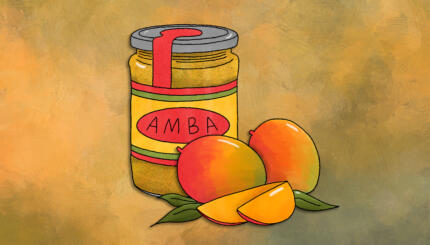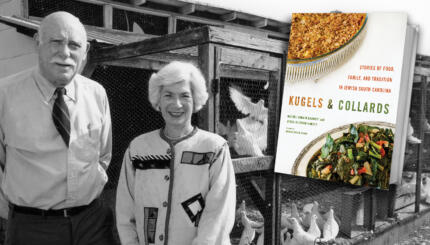As we celebrate Passover, many of us will ask, “Why is this night different from all other nights?” In my work at Keshet, I get to ask a similar question: “Why is our LGBTQ and Ally Teen Shabbaton different from all other Jewish spaces?” The answer, I think, is that this is one of the few spaces where LGBTQ-Jewish teens are able to gather from all over the country, to create a community and to grow as leaders. That, I believe, is what can bring us liberation — the same liberation that we are going to start celebrating tonight. Over the past week we have showcased some Shabbaton participants from around the country and shared their thoughts on liberation, Passover, and why the Shabbaton is different from all other Jewish communities. So today, as we end Passover, we wanted to share those thoughts in a broader way.
Have your own thoughts? Post a photo about it and tag us!
Emma Canter
What, to you, makes the Women and Girls Shabbaton different from other (Keshet and non-Keshet) shabbatonim?
Keshet Shabbatonim have a very special place in my heart. The 2016 East Coast Shabbaton was the first space in which I could be QueerAndJewish. My identities didn’t have to be separate – they were smushed together for the very first time, and have remained intertwined ever since. Women and Girls gives participants the chance to embrace their identities in the QueerAndJewish space. Our experiences as Jewish women are alike and different in so many ways, and we can’t wait to talk about it with you. Also, the Shabbaton will be unique as our amazing staff is all women who are working incredibly hard to put together a wonderful spiritual and educational space.
What’s a memory/highlight from the last few Shabbatonim?
My favorite memory of my last Shabbaton, West Coast 2019, was waking up early Sunday morning and taking a beautiful sunrise hike in the LA mountains with my friends.
What’s your favorite thing about Passover?
My favorite thing about Passover is that it is a story of liberation. It’s such a powerful reminder of Jewish resilience in a world that needs it. Also matzo ball soup is a pretty great part.
What does liberation mean to you? How does the shabbaton help fulfill that vision?
Liberation, to me, is collective strength in the face of oppression. I see liberation in every connection made at Keshet Shabbaton. Liberation is joining together in Kabbalat Shabbat, laughing fully over dinner, and inspiring conversations during teen-planned programming. Liberation is the light that Keshet Shabbatonim bring to so many teens, and the spark that it ignites in each of us.
Joseph Hunt
What’s a memory/highlight from the last few Shabbatonim? One highlight that I have from the 2019 East Coast Shabbaton was after I held a session called ‘Being Shut Out: How to Live in an Unsupportive Environment.’ From the time the session ended to when I got back home in Chicago, people came up to me and shared their experiences of being in an unsupportive family, relationship, friendship, school, etc. It made me feel so good that I helped people by sharing my hard experiences, so that they know that they aren’t alone. The support that I got from the participants that were in my session was such an amazing feeling.
What’s your favorite thing about Passover?
My favorite thing about the holiday of Passover is hearing the story about how the Jewish People were taken out of Egypt from their 210 years of slavery, and brought to Mount Sinai to receive the Bible. This story shows how the Jewish People just got out of an intense situation and stuck together as a nation. The Jewish People were so used to being told what to do and when to do it that they started to feel unworthy and like less of a person. Being taken out of Egypt gave them the opportunity to regain the feeling of being their own person again.
I take that story to heart and I think about how possible it is to be a nation who loves and supports each other, while still being their own unique and individual self.
What does liberation mean to you?
To me, liberation means that someone goes from a restrictive and unhealthy environment where they don’t get the freedom to be their true and unique self, to a place in their life that they have that freedom. Liberation isn’t just being freed from something, it’s getting the chance to emotionally, physically, and socially be your 100% authentic self.
How does the Shabbaton help fulfill that vision?
The Keshet Shabbatonim helps to fulfill the vision of liberation with its perfect amount of love and support that everyone involved gives. Nobody judges others for how they want to express themselves, they just want everyone to be happy.
Dani English
What, to you, makes the Post-high School Shabbaton different from other (Keshet and non-Keshet) shabbatonim?
I think what is going to make this post-high school shabbaton different from all the other shabbatonim is the ability to make connections with other LGBTQ Jewish adults and talk about the kind of work they’ve been doing in their respective communities. It’ll be amazing to learn what kind of activism, etc. folks have gotten involved in, especially if I get to see some familiar faces from past shabbatonim!
What is a memory or highlight from the last Shabbaton you attended?
I can’t decide between two of my favorite Shabbaton memories so I will share both! The first was walking over to the farming area of the place the shabbaton was held at and getting to meet some cute baby goats! The other memory that sticks out is watching havdalah while sitting around a big campfire and talking with other teens before and after about how our Shabbat was spent.
What is your favorite thing about Passover?
As with any Jewish holiday, one of my favorite aspects is the different meals and treats we can make! I’m looking forward to matzo ball soup at my close friend’s seder, and making matzo crack (matzo with caramel and chocolate) later on to share with Jewish and non-Jewish friends.
What does liberation mean to you?
Liberation to me means freedom from oppressions, and access to safety and comfort amongst our various communities.
Owen Schwartz
What, to you, makes the Trans Shabbaton different from other (Keshet and non-Keshet) shabbatonim?
The Keshet Trans Shabbaton is different because it sets aside a space within the LGBTQ Jewish community for trans individuals to have their own space to be themselves. It’s a really unique opportunity for us to share ideas and feelings that are related directly to being trans.
What’s a memory/highlight from the last few Shabbatonim?
My best memories from the previous shabbaton I attended were all the moments that included feelings of belonging and feeling included and accepted. I loved being able to spend time with people who I felt I had a connection with on several levels.
What’s your favorite thing about Passover?
My favorite thing about Passover is getting to honor the past and recognize why we as Jewish people celebrate Passover, as well as being with family.
What does liberation mean to you? How does the Shabbaton help fulfill that vision?
Liberation, to me, means the ability to be yourself and express your ideas without hindrance. The Shabbatonim are a space where I can be that.
To learn more about Keshet Shabbatonim head to https://www.keshetonline.org/teenshabbaton/


